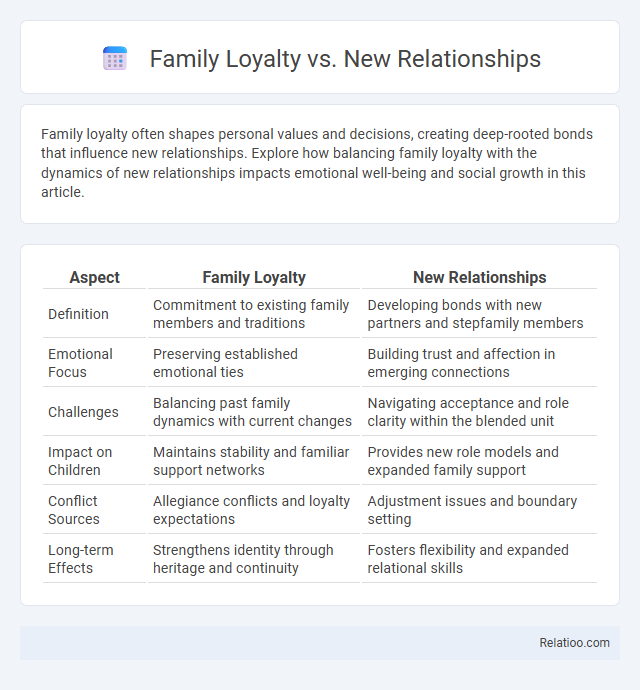Family loyalty often shapes personal values and decisions, creating deep-rooted bonds that influence new relationships. Explore how balancing family loyalty with the dynamics of new relationships impacts emotional well-being and social growth in this article.
Table of Comparison
| Aspect | Family Loyalty | New Relationships |
|---|---|---|
| Definition | Commitment to existing family members and traditions | Developing bonds with new partners and stepfamily members |
| Emotional Focus | Preserving established emotional ties | Building trust and affection in emerging connections |
| Challenges | Balancing past family dynamics with current changes | Navigating acceptance and role clarity within the blended unit |
| Impact on Children | Maintains stability and familiar support networks | Provides new role models and expanded family support |
| Conflict Sources | Allegiance conflicts and loyalty expectations | Adjustment issues and boundary setting |
| Long-term Effects | Strengthens identity through heritage and continuity | Fosters flexibility and expanded relational skills |
Understanding Family Loyalty: Definition and Importance
Family loyalty refers to the deep-rooted commitment and emotional bond shared among family members, often influencing decisions and behavior in significant ways. Understanding family loyalty is crucial because it shapes your ability to balance long-standing relationships with the challenges of forming new connections and managing emotional adjustments. Recognizing these dynamics helps you navigate conflicts while preserving trust and support within both old and new relationships.
New Relationships: Navigating Fresh Emotional Bonds
Navigating new relationships requires careful emotional adjustment as you balance existing family loyalty with fresh emotional bonds. Building trust and understanding in these new connections fosters personal growth and enriches your social network. Prioritizing clear communication and empathy ensures successful integration of new relationships without compromising long-standing family ties.
The Psychological Roots of Family Allegiance
The psychological roots of family allegiance often stem from early attachment patterns formed during childhood, which shape an individual's sense of loyalty and belonging. Neurobiological factors such as oxytocin release reinforce emotional bonds within the family unit, influencing decisions when balancing family loyalty against new relationships. Emotional adjustment requires navigating these deep-seated loyalties while integrating new social connections and maintaining mental well-being.
Challenges in Balancing Old Ties and New Connections
Navigating family loyalty while forming new relationships presents significant emotional challenges as your commitments and loyalties may conflict, leading to feelings of guilt, stress, or divided attention. Balancing these complex dynamics often requires careful emotional adjustment, especially when longstanding family expectations clash with evolving social ties and personal growth. Developing clear boundaries and open communication helps mitigate the tension between honoring old commitments and embracing new connections.
Conflicts Arising Between Family Expectations and Partners
Conflicts between family loyalty and new relationships often arise when partners face opposing expectations regarding roles, values, or traditions, leading to emotional adjustment challenges. Navigating these tensions requires balancing respect for familial bonds with the development of independent partnership dynamics, which can cause stress and require compromise. Effective communication and empathy are crucial in reconciling family demands with the evolving needs of romantic relationships, minimizing long-term emotional strain.
Communicating Boundaries with Family and Loved Ones
Communicating boundaries with family and loved ones is essential for balancing family loyalty, new relationships, and emotional adjustment. Clear, respectful dialogue about personal limits helps prevent misunderstandings and fosters mutual respect, allowing individuals to nurture new connections without compromising existing familial bonds. Establishing consistent boundaries supports emotional well-being by reducing conflict and promoting healthy interactions across all relationships.
Cultural Perspectives on Family vs Partner Loyalty
Cultural perspectives often shape how individuals balance family loyalty and new relationships, influencing emotional adjustment during transitions. In collectivist societies, your duty to family may supersede partner loyalty, creating tension when prioritizing romantic relationships. Navigating these cultural expectations requires emotional resilience to harmonize traditional family obligations with the needs of new partnerships.
Impact of Family Loyalty on Relationship Stability
Family loyalty significantly influences relationship stability by fostering trust and emotional support that anchors partners during conflicts or challenges. Strong family ties often create a network of shared values and expectations, which can either strengthen or strain new relationships depending on the alignment between familial traditions and individual needs. Emotional adjustment becomes critical as individuals navigate balancing allegiance to family with developing intimacy and trust in new relationships, impacting long-term relational satisfaction and resilience.
Strategies for Harmonizing Family and Romantic Priorities
Balancing family loyalty with new romantic relationships requires clear communication and boundary-setting to ensure both parties feel respected and valued. Your emotional adjustment benefits from prioritizing empathy, open dialogue, and consistent effort to integrate family traditions with new shared experiences. Establishing mutual goals and support systems helps harmonize these overlapping priorities without compromising individual or collective well-being.
Making Informed Choices: Loyalty, Happiness, and Growth
Balancing family loyalty with new relationships requires careful emotional adjustment to ensure your happiness and personal growth. Making informed choices involves evaluating how family ties influence your well-being while embracing new connections that foster mutual support. Prioritizing both loyalty and fresh bonds helps maintain harmony and enrich your emotional resilience.

Infographic: Family Loyalty vs New Relationships
 relatioo.com
relatioo.com